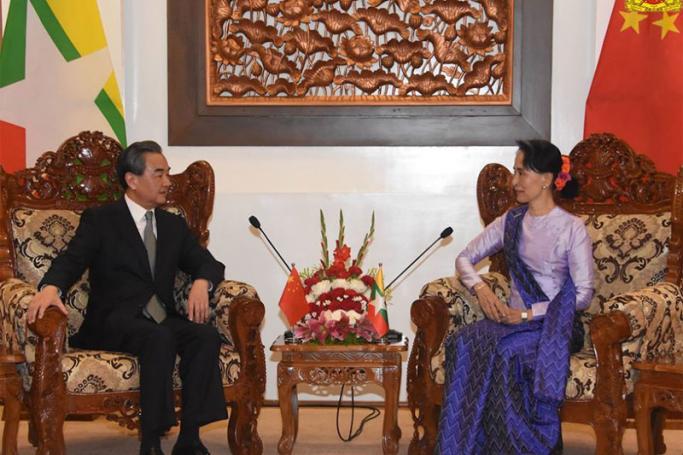China has proposed building an economic corridor with Myanmar to further enhance bilateral pragmatic cooperation, with observers saying the corridor could maximize revenue for both countries and contribute to the stability of Myanmar and the China-Myanmar border.
Chinese Foreign Minister Wang Yi announced Sunday China's proposal to build the economic corridor at a press conference with Myanmar's State Counsellor and Foreign Minister Aung San Suu Kyi following their talks, and stressed that the two countries have a great potential for cooperation as their economies are highly complementary.
The economic corridor, which would help Myanmar's development plan and needs, will start in China's Yunnan Province, extend to the central Myanmar city of Mandalay, and then east to Yangon and west to the Kyaukpyu special economic zone, forming a three-pillar giant cooperation pattern, Wang said, adding that the proposal will further develop China-Myanmar cooperation under the Belt and Road initiative.
The corridor, which connects both Myanmar's core economic zone and its less-developed western part, could balance development across the country, Song Qingrun, a research fellow at the China Institute of Contemporary International Relations, told the Global Times.
Due to its location between China and Southeast Asia, Myanmar serves as an important intersection for China's Belt and Road initiative. The establishment of the corridor will allow China to access the Indian Ocean more conveniently, Gu Xiaosong, head of Southeast Asian Studies at the Guangxi Academy of Social Sciences, told the Global Times.
"The corridor could help ease Myanmar's conflict and ensure stability along the border between China and Myanmar by providing greater employment and better living standards for Myanmar people," said Chen Fengying, another research fellow at the China Institute of Contemporary International Relations.
At the press conference, China's top diplomat also expressed support for Myanmar's peace process.
Wang said that the plan should consider Myanmar's most urgent needs and start from projects that Myanmar needs most and gradually achieve mutual benefits.
Myanmar needs infrastructure and electric power projects, Gu said, adding that the two countries enjoy enhanced cooperation in energy with the building of oil and gas pipelines.
The two countries agreed to start operating a $1.5 billion pipeline in April, which allows China to import oil through the Bay of Bengal, which has an estimated capacity of 22 million tons of crude oil per year.
Trade between Myanmar and China amounted to over $5.5 billion in the first half of the fiscal year, the Global New Light of Myanmar reported.
"The proposed corridor will not be exclusive, and its future projects will also seek cooperation from other countries including the US, Japan and India which have exerted their influence on Myanmar in many areas," Song said.
Wang said China proposed a three-phase solution to help settle the issue in Myanmar's Rakhine state. Some 800,000 Rohingyas in all have fled Myanmar since 2012, according to UN officials.
Three-phase solution
The first phase is to achieve a ceasefire so residents are no longer displaced. The ceasefire is now in effect, Wang said.
Second, the international community should encourage Myanmar and Bangladesh to keep communication lines open in a bid to arrive at a feasible solution to the issue, he said. The two countries have reached an initial agreement on repatriating refugees who have fled to Bangladesh.
The third phase is to find a long-term solution. Stressing that poverty is the root cause of the conflict, the Chinese foreign minister called on the international community to support poverty alleviation efforts in Rakhine state.
China is willing to make constructive efforts to contribute to a peaceful resolution and maintain stability and development of Myanmar, Chinese foreign ministry spokesperson Lu Kang said Monday.
Courtesy Global Times
You are viewing the old site.
Please update your bookmark to https://eng.mizzima.com.
Mizzima Weekly Magazine Issue...
14 December 2023
Spring Revolution Daily News f...
13 December 2023
New UK Burma sanctions welcome...
13 December 2023
Spring Revolution Daily News f...
12 December 2023
Spring Revolution Daily News f...
11 December 2023
Spring Revolution Daily News f...
08 December 2023
Spring Revolution Daily News f...
07 December 2023
Diaspora journalists increasin...
07 December 2023
Twitter says hackers 'manipulated' employees to access accounts












